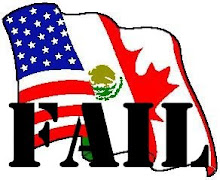I blogged back in December about Canadian author Peter Watts and his ordeal trying to come back into Canada from the US. The trial has occurred and with it details of what actually happened.
Peter was not convicted of any assault of an officer…in fact, all those allegations were debunked at trial. He was however convicted of “failing to comply with a lawful command”. What exactly was the failure? Peter describes it from his blog:
So what it came down to, ultimately, was those moments after I was repeatedly struck in the face by Beaudry (an event not in dispute, incidentally). After Beaudry had finished whaling on me in the car, and stepped outside, and ordered me out of the vehicle; after I’d complied with that, and was standing motionless beside the car, and Beaudry told me to get on the ground — I just stood there, saying “What is the problem?”, just before Beaudry maced me.
And that, said the Prosecutor in her final remarks — that, right there, was failure to comply. That was enough to convict.
The statute being used here is Section 750.81d which status, among other things:
(1) Except as provided in subsections (2), (3), and (4), an individual who assaults, batters, wounds, resists, obstructs, opposes, or endangers a person who the individual knows or has reason to know is performing his or her duties is guilty of a felony punishable by imprisonment for not more than 2 years or a fine of not more than $2,000.00, or both.
Interesting. So “failure to comply” is being used as a synonym for “obstructs” it seems…how scary that simply questioning a law enforcement officer can net you up to 2 years in prison and/or up to $2,000 in fines.
While the jury did find him guilty, there have been comments supposedly by jury members who have voiced their support for Peter and that they didn’t think he really had done anything wrong, but they couldn’t argue in light of the law: yes, he had “failed to comply”, and thus “obstructed”. You can read a recent post (and subsequent ones) on Peter’s blog that talk about it.
There’s a clear message that’s been sent from this whole endeavour, from CBP, DHS, and the DA’s office:
We’re not reasonable.
It’s obvious officer Beaudry crossed a line, yet we hear nothing of punishment for his zealous actions and because of Peter’s conviction he can’t bring charges up against the officer.
If the jury, after reviewing all the evidence, really didn’t think Peter was guilty of anything other than a very loosely interpreted meaning of “obstructed”, why couldn’t the prosecutor come to the same conclusion?
The fact this went to trial at all is outrageous! Really, this entire episode couldn’t have been rectified civilly without the need for formal charges and a court hearing?
Over at Scott H. Greenfield’s criminal defence blog, he wrote about the case and we get some great insight from someone in the legal system. He writes:
Had the border guard been civil, cooperative, polite, normal, this would never have escalated into a dispute. That's the normal perspective. From the guard's perspective, had Peter Watts just done what he was told to do without challenging the guard's authority to do his job, this wouldn't have escalated into a dispute. The law sides with the guard, since the guard does the dirty work of the law and the law tries to make his job easier in return by providing him with authority far beyond the limits of good judgment. Order is paramount, and would be put at risk if our boys on the front line don't have our blind support.
…
The system didn't fail Peter. The system worked perfectly. It's the expectation that the system exists to satisfy some existential concept of justice that causes the dissonance. Putting aside the axiom that justice is in the eye of the beholder, the system doesn't exists to serve justice. The system exists to maintain order. Did you think otherwise?
…
Like Cory Doctorow, I agree completely that Peter Watts' conviction is absurd and horrible. He was convicted for acting like a normal person under abnormal circumstances. He was convicted for lacking the understanding that when interacting with officials with guns and shields, one bows deeply like a supplicant, just to avoid irritating small minds.
And so I close re-stating the sentiment I had when I first blogged about Peter’s plight. The US is not our country, its not our law, it holds no guarantees or privilege for us. It also hires people like Officer Beaudry to police its borders, and if officers like him are over-zealous in their actions it doesn’t matter – the law is on their side, not ours. We are true foreigners when we cross that border, no longer brothers from different homelands.
USA – Enter at your own risk.




